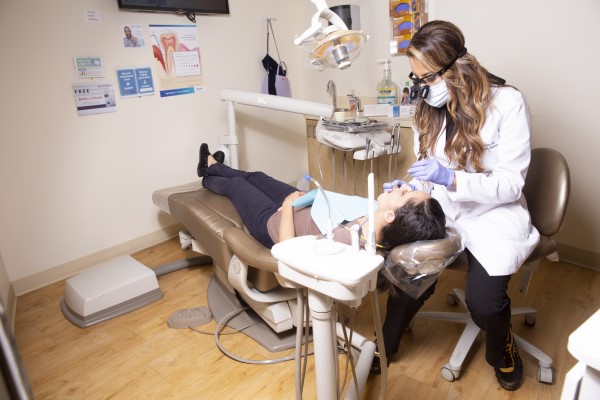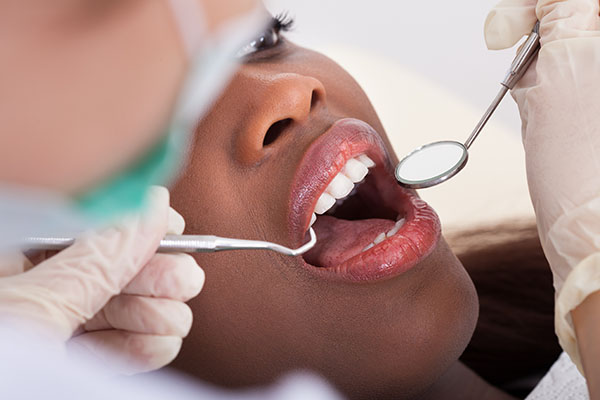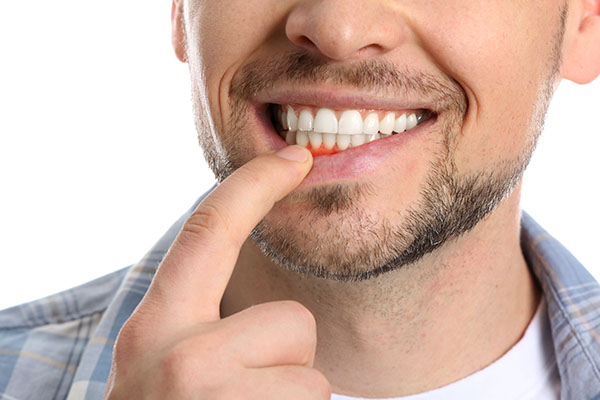Ask a Dentist – The Role of Plaque in Periodontal Disease

Inflammation of the gums and tissues surrounding the teeth, known as periodontal disease, is a common and serious condition that many dental patients face. However, plaque and gum disease can be easily avoided with proper care.
The connection between plaque and periodontal disease
Plaque is directly linked to the development of inflammation and diseases of the teeth and gums. Poor dental hygiene results in a buildup of plaque on the teeth, which can lead to serious consequences such as periodontal disease if left untreated.
What is plaque?
Plaque, a sticky film that forms on the teeth, occurs when saliva mixes with sugars and starches that are in foods and drinks. This results in bacteria that sticks onto the surface of the teeth and gums. The bacteria from plaque produces an acid that can destroy enamel and leave teeth vulnerable to cavities. Plaque forms quickly, which is why it is important to brush and floss teeth regularly.
What is tartar?
When the teeth are not cleaned thoroughly, plaque is not removed and may harden below and above the gumline; this is called tartar. Tartar, also known as calculus, makes typical brushing and flossing difficult. Because this buildup hardens on the teeth and gumline, it must be removed by a dentist.
How does gingivitis happen?
If plaque and tartar remain on the teeth for a prolonged period of time, it can lead to gingivitis. This minor form of gum disease results in redness, soreness, swelling, irritation and bleeding of the gums. If taken care of early, gingivitis can be reversed.
How does periodontal disease develop?
Periodontal disease, also referred to as periodontitis, is the most severe form of gum disease. This condition occurs when gingivitis is left untreated and can have devastating consequences. With periodontitis, the infection from the bacteria causes the gums to recede and pull away from the teeth. If the disease is further ignored, the bones in the jaw supporting the teeth can be destroyed and lead to tooth loss.
Can gum disease be prevented?
Proper oral hygiene is the easiest way to prevent plaque, tartar and gum diseases. Brushing the teeth with fluoridated toothpaste at least twice a day can help remove plaque and inhibit the formation of tartar. In addition to regular brushing, dental patients should also floss once a day and use mouth rinses to further reduce buildup. It is important to maintain a healthy diet, as bacteria in the mouth thrive on sugars and simple carbohydrates. Patients should avoid smoking because that can increase plaque and tartar as well. Preventative care and frequent dental check-ups are vital, particularly since early gum disease is easily overlooked.
Conclusion
Poor oral health is linked to the development of plaque. This plaque, if left untreated, can result in periodontal disease. When patients practice good hygiene, have a healthy diet and visit the dentist regularly, they greatly reduce the risk of developing gum disease.
Request an appointment here: https://dentistmiamibeachfl.com
Check out what others are saying about our dental services on Yelp: Gum Disease in Miami Beach, FL.
Recent Posts
Food and drink have a lot to do with oral health, but certain medications can also have an impact. While bleeding gums are often associated with signs of plaque buildup along the gum line, it is possible for those who take blood thinners to be more susceptible to this condition as well.Blood thinners are used…
Although the gums may bleed occasionally from rough brushing or flossing too vigorously, frequent bleeding gums are a sign that something is wrong. Dental issues are the most common cause of this bleeding, often due to proper oral hygiene not being practiced. Depending on the cause of the bleeding, there are certain treatments and preventative…
Bleeding gums are the most common oral health issue that people experience. You might think you can ignore your bleeding gums or think the issue is not serious. Research shows that your periodontal health does impact your health in other ways. Often bleeding gums is the most obvious sign that all is not well in…
Patients who notice their gums bleeding upon brushing, flossing, or even eating may initially panic. However, while bleeding gums often signify the beginnings of gingivitis, this inflammation and the resulting gum disease can be reversed with timely and targeted treatments if it is caught soon enough. It is important to investigate the cause of long-term…


